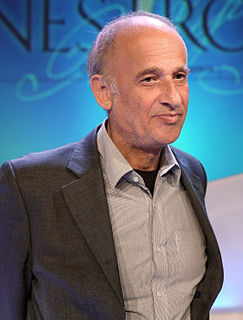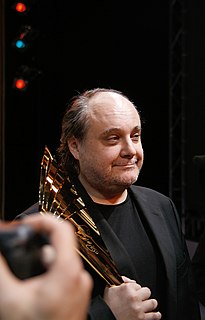
Michael Thalheimer (born 28 May 1965) is a German theatre director.

Michael Thalheimer (born 28 May 1965) is a German theatre director.
Born in Münster, Thalheimer studied from 1985 to 1989 at the Bern School of Acting, [1] now integrated into the University of the Arts Bern. As an actor, he was engaged at many German-speaking theatres, including in Bern, Mainz, Bremerhaven and Chemnitz.
In 1997, he presented his first production at the Theater Chemnitz: [1] Fernando Arrabal's The Architect and the Emperor of Assyria. Since his work at the theatre in Chemnitz, he has worked with the set designer Olaf Altmann as a permanent collaborator. Many productions followed at renowned theatres such as the Theater Freiburg, the Theater Basel, the Schauspiel Leipzig , the Staatsschauspiel Dresden, the Thalia Theater in Hamburg, the Deutsches Theater Berlin and the Schaubühne of Berlin. [1] [2]
In 2005, Thalheimer made his debut as an opera director with Leoš Janáček's Káťa Kabanová at the Staatsoper Unter den Linden, followed in December of the same year by an interpretation of Verdi's Rigoletto .
At Hamburg's Thalia Theater in particular, Thalheimer acquired an excellent reputation as a theatre director with productions of Schiller's Kabale und Liebe , Schnitzler's Liebelei and other classics. He is able to reduce even the most difficult material to its basic content and transport it emotionally and mentally. As a perfectionist, Thalheimer attaches great importance to the facial expressions and gestures of his actors, who sometimes fill minutes of wordless phases, which are then replaced by a flood of text recited in paragraphs and performed in staccato.
After many successful years at Hamburg's Thalia Theater, Thalheimer shifted his work more and more to the Deutsches Theater in Berlin. After he had achieved the greatest success there in years with his two productions of Goethe's Faust I and Faust II , which were acclaimed by critics and audiences alike, he was head director from 2005 to 2008. [3] [4]
His production of Dea Loher's play Innocence became the subject of a protest action in spring 2012. [3] [5]
Burgtheater / Akademietheater:
Jürgen Flimm is a German theater and opera director, and theater manager. After establishing himself as one of the exponents of Regietheater, Flimm was called to manage renowned theaters and festivals. His operatic productions in Germany led to an international career, with operas staged in the Netherlands, Austria, Switzerland, England, Italy, and the United States.

Luc Bondy was a Swiss theatre and film director.

Helmuth Lohner was an Austrian actor, theatre director, and from 1997 to 2006 director of the Theater in der Josefstadt.

Paulus Manker is an Austrian film director and actor, as well as an author and screenplay writer.
Nicolas Stemann is a German theatre director. He is best known for directing the 2002 stage production of Hamlet at Schauspiel Hannover, a theatre in Hanover.
Andrea Breth is a stage director. From 1999 to 2019 she was in-house director at the Burgtheater in Vienna and also directed for the Salzburg Festival.

Martin Kušej is an Austrian theatre and opera director, and is director of the Burgtheater Vienna. According to German news magazine Focus, Kušej belongs to the ten most important theatre directors who have emerged in the German-speaking world since the millennium. He is considered one of the most important directors working today, acclaimed for his dark and incisive productions.
Radikal jung – Das Festival junger Regisseure is an annual weeklong German theatre festival at the Münchner Volkstheater, Munich. It began in 2005 as a forum and stage for the next generation of directors.
Markus Boysen is a German actor.
Anja Brünglinghaus is a German actress.

Samuel Finzi is a Bulgarian-German actor. Since his start in the late 1980s, he has hundreds of film, television, and theatrical credits. Between 1993 and 2011, he received ten acting awards.

Dea Loher is a German playwright and author.

Joachim Philipp Maria Meyerhoff is a German actor, director, and writer.
Peter Fitz was a German stage and film actor.

Ignaz Kirchner was a German actor who made a career on German-speaking stages, especially at Vienna's Burgtheater where he played for 30 years. A character actor, he worked with leading stage directors. He often played opposite Gert Voss, both in classical drama such as Shakespeare's Antonio, with Voss as Shylock, and as Jago, with Voss as Othello, and especially in black comedies, such as Goldberg in Tabori's Die Goldberg-Variationen, and in Neil Simon's The Sunshine Boys, Beckett's Endspiel and Genet's Die Zofen. Kirchner and Voss were named Schauspielerpaar des Jahres twice, in 1992 and 1998.
The Nestroy Theatre Prize is an Austrian theatre award named after the poet Johann Nestroy. In 2000, the city of Vienna decided to combine two less noticed theatre awards: the Kainz Medal and the Nestroy Ring for Viennese Satire. The prize honours outstanding achievements at the Viennese and other Austrian theatres. The prize has been awarded annually in eight up to fourteen categories. Its ceremony is held in Vienna and broadcast live on national television.
Hellmuth Matiasek, also Helmuth Matiasek, is an Austrian theatre and film director.
Katrin Lea Tag is a German scenic and costume designer for drama and opera, whose works have appeared internationally. In 2020, she was named Scenic Designer of the Year by Opernwelt, for productions such as Barrie Kosky's Salome for the Oper Frankfurt.

Die Schutzbefohlenen, is a play by Elfriede Jelinek written in 2013. She termed it a Sprachkunstwerk, a language artwork. It deals critically with the politics at the time concerning refugees. The play was first read in Hamburg on 21 September 2013. The first scenic production was in Mannheim on 23 May 2014. The first production in Austria was staged at the Burgtheater in Vienna on 28 March 2015, which was recognised internationally. Later that year, Jelinek expanded the text to reflect the changed political situation.
Olaf Altmann is a German scenic designer.
Hans-Dieter Schütt (ed.): Michael Thalheimer. Porträt eines Regisseurs. [1] Verlag Theater der Zeit, Berlin 2017, ISBN 978-3-95749-095-7.